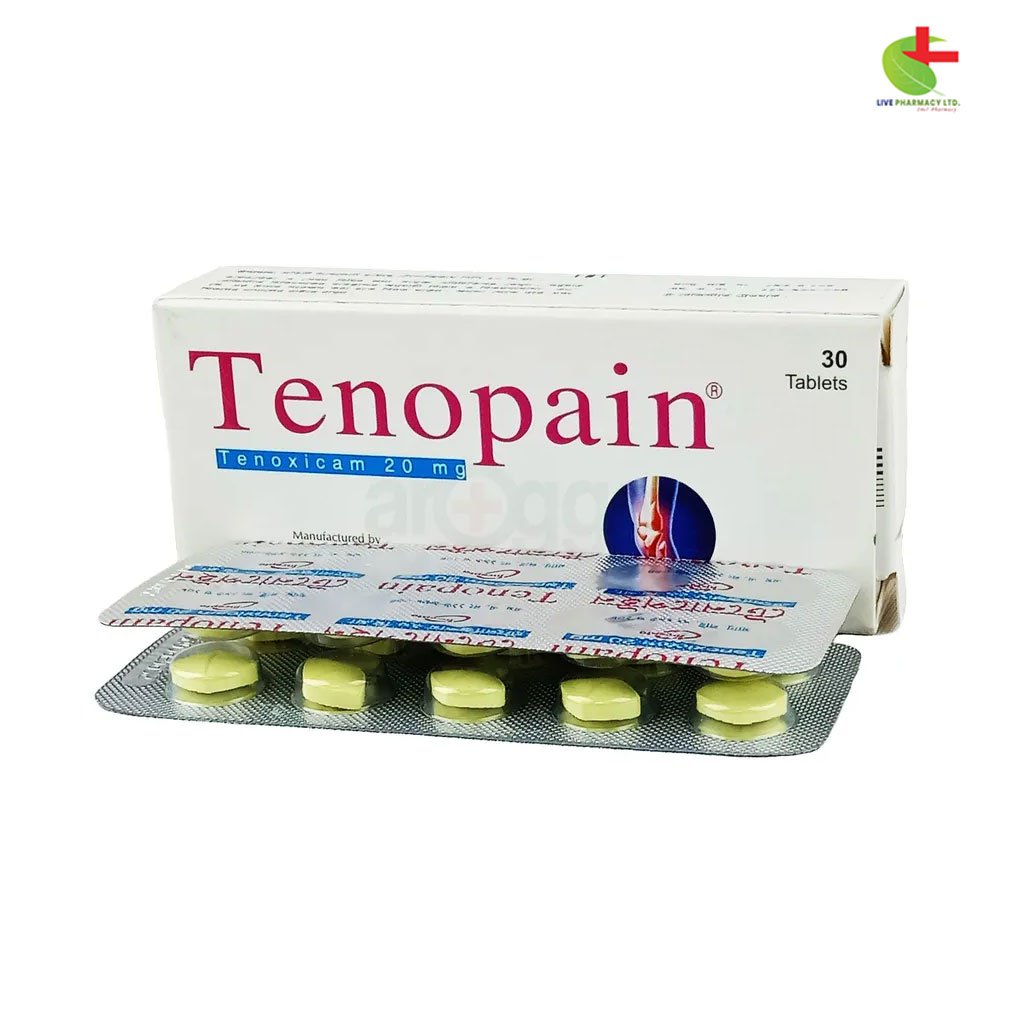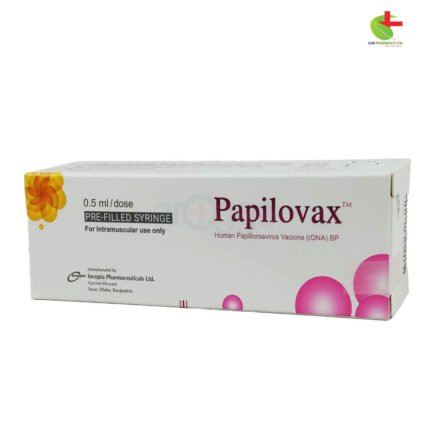Tenopain
80.00৳ Strip(10)
- Tenopain, containing Tenoxicam, is a non-steroidal anti-inflammatory drug (NSAID) indicated for pain relief in inflammatory and degenerative musculoskeletal conditions.
- It is used to treat rheumatoid arthritis, osteoarthritis, ankylosing spondylitis, tendonitis, bursitis, and acute gout.
- Tenopain inhibits prostaglandin synthesis, providing anti-inflammatory, analgesic, and antipyretic effects.
- Caution is advised in patients with renal, hepatic, or cardiovascular conditions.
- Not recommended for children under 16 years; store below 30°C, protected from light and moisture.
 Brand
Brand
|
Incepta Pharmaceuticals Ltd |
|---|---|
 Generics
Generics
|
Tenoxicam |
 Type
Type
|
Tablet |
Indications
Tenopain is indicated for the symptomatic treatment of painful inflammatory and degenerative disorders of the musculoskeletal system, including:
- Rheumatoid arthritis
- Osteoarthritis
- Arthrosis
- Ankylosing spondylitis
- Extra-articular disorders, such as tendinitis, bursitis, periarthritis of the shoulders or hips, strains, and sprains
- Acute gout
- রেজিস্টার্ড চিকিৎসকের পরামর্শ মোতাবেক ঔষধ সেবন করুন
Pharmacology
Tenoxicam, the active ingredient in Tenopain, is a non-steroidal anti-inflammatory drug (NSAID) with anti-inflammatory, analgesic, and antipyretic properties. It also inhibits platelet aggregation and prostaglandin biosynthesis, acting as a scavenger for active oxygen at inflammation sites. Additionally, Tenoxicam inhibits human metalloproteinases involved in cartilage breakdown, providing therapeutic benefit in treating musculoskeletal disorders. Animal studies have shown no mutagenic, carcinogenic, or teratogenic effects, but renal and gastrointestinal effects, increased dystocia, and delayed parturition were noted.
Dosage
- Standard Dosage: For all indications except acute gout, 20 mg once daily.
- Acute Gout: 40 mg once daily for two days, followed by 20 mg once daily for five days.
- Chronic Disorders: Limit to 20 mg daily; for long-term treatment, 10 mg may be tried for maintenance.
Elderly patients and those with kidney or liver disease may use the same dosage guidelines. There are no established recommendations for children and adolescents.
- রেজিস্টার্ড চিকিৎসকের পরামর্শ মোতাবেক ঔষধ সেবন করুন
Administration
Take Tenopain with a glass of water, preferably with or immediately after meals.
Interaction
- Salicylate and NSAIDs: Avoid concurrent use due to increased gastrointestinal risk.
- Methotrexate: Caution due to potential toxicity from decreased renal secretion.
- Lithium: Monitor plasma levels due to potential toxicity from reduced clearance.
- Diuretics and ACE Inhibitors: May reduce efficacy; avoid K-sparing diuretics to prevent hyperkalemia and renal failure.
- Antidiabetic Drugs: Monitor closely due to potential interaction.
Contraindications
Tenopain is contraindicated in patients with:
- Hypersensitivity to tenoxicam or similar drugs
- NSAID-induced asthma, rhinitis, or urticaria
- Upper gastrointestinal disorders, such as gastritis or peptic ulcers
Side Effects
Common (>1%):
- Gastrointestinal: Discomfort, dyspepsia, nausea, heartburn
- CNS: Dizziness, headache
Less Common (<1%):
- Gastrointestinal: Constipation, diarrhea, vomiting, ulcers, GI bleeding
- Skin: Rash, itching
- Others: Elevated liver enzymes, palpitations
Rare (<0.01%):
- Gastrointestinal: GI perforation
- Skin: Severe reactions like Stevens-Johnson syndrome
- Blood: Anemia, leukopenia, thrombocytopenia
Pregnancy & Lactation
Avoid Tenopain during the third trimester as it may cause fetal complications. A small amount of tenoxicam passes into breast milk; thus, breastfeeding should be discontinued or the drug avoided.
Precautions & Warnings
- Monitor renal and cardiac function, especially in patients at risk for renal failure.
- Discontinue immediately if gastrointestinal bleeding or severe skin reactions occur.
- Visual disturbances may require an ophthalmic evaluation.
Use in Special Populations
- Children & Adolescents: Not recommended for those under 16 years due to unestablished safety.
- Driving and Operating Machines: Refrain if experiencing dizziness, vertigo, or visual issues.
Overdose Effects
In case of overdose, expect intensified undesirable effects. Treat with measures to reduce absorption (e.g., gastric lavage) and accelerate elimination (e.g., cholestyramine).
Therapeutic Class
- Drugs for Osteoarthritis
- Drugs for Rheumatoid Arthritis
- NSAIDs
Storage Conditions
Store below 30°C, away from light and moisture. Keep out of reach of children.













Reviews
There are no reviews yet.